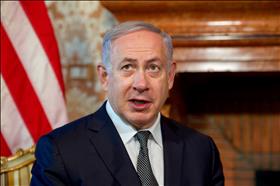Join our next webinar, following the fourth round of elections
The Fourth Elections are upon us
Next Tuesday, Israel will go to the polls for the 4th time in two years. All the many polls being conducted ahead of the elections indicate uncertainty as to their outcome.
Uri Regev 19/03/2021 05:59
Tags: Elections · Benjamin Netanyahu

Bibi Netanyahu, source: Wikipedia
Although Israel is not a two-party state, dozens of parties are vying for the voter's vote. Some 13 parties may realistically pass the electoral threshold, and it is clear that the main division between these parties is into two groups: those committed to supporting Netanyahu as prime minister and those opposed to the continuation of his tenure. These two camps are almost equal in size, by a margin of 1-2 seats. In some surveys, this gap works in favor of the Bibi camp, and in some of them – in favor of the "just not Bibi" camp.
In relation to 4 of the 19 parties, question marks appear in some of the polls, as to the likelihood of their passing the electoral threshold; since some among them belong to the each of the two camps, the failure of any of these four may dictate the outcome of the election. The difficulty in interpreting the data in advance stems, in part, from a disturbing strategy of fraudulent survey responses, which manifests itself, for example, in encouraging Likud / Yamina voters to respond tell pollsters that they will vote for the Blue & White party, in order to create false results. Furthermore, the percentage of voter turnout in these elections is also unclear, and since the gap between the two camps is so small, any minimal change in the turnout of one or the other camp’s voters may also dictate the outcome of the election. It is no wonder, therefore, that many believe that even this fourth round of elections will not bring political stability. Many believe that Israel will be facing a nightmare 5th round of elections in a several months.
One of the unique features of this election round is that it is clearly no longer between right and left, as the Bibi camp is right-wing, as are many parties in the "just not Bibi" camp.
One of the unique features of this election round is that it is clearly no longer between right and left, as the Bibi camp is right-wing, as are many parties in the "just not Bibi" camp. A prominent feature of these elections is, therefore, matters of religion and state. The Bibi camp includes the ultra-Orthodox parties at its center, making it clear that doing damage to the Supreme Court and blocking the non-Orthodox Jewish denominations, as well as enforcing ‘blue laws’ on the Sabbath, gender separation, full exemption from military or civilian service for yeshiva students, and more, are preconditions for their support of Bibi’s continued rule. The "Just Not Bibi" camp has a variety of voices, and prominent among them are the voices demanding the promotion of civil marriage, abolition of religious coercion, and more. We recommend that our readers join us at Hiddush’s next webinar, which will be held next Thursday, in which we will analyze the election results, focusing upon their possible implications for religion and state issues, Jewish pluralism, and the future of Israel-Diaspora relations.
Of course, all of these also have to do with the Supreme Court ruling on the issue of recognizing non-Orthodox converts for the purpose of the Law of Return. The responses to the ruling underscore the extent to which these issues are also related to Diaspora Jewry and the future of its partnership with the State of Israel. As we wrote in the last newsletter, these developments put the Jewish leadership in the Diaspora to the test, especially in North America. We hope the leadership will make its voice heard, for not only the future of the State of Israel is at stake, but also the future of Jewish unity and Jewish peoplehood.